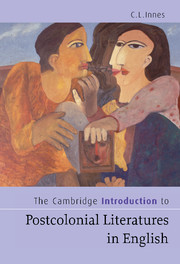Book contents
- Frontmatter
- Contents
- Preface
- Chapter 1 Introduction: situating the postcolonial
- Chapter 2 Postcolonial issues in performance
- Chapter 3 Alternative histories and writing back
- Chapter 4 Authorizing the self: postcolonial autobiographical writing
- Chapter 5 Situating the self: landscape and place
- Chapter 6 Appropriating the word: language and voice
- Chapter 7 Narrating the nation: form and genre
- Chapter 8 Rewriting her story: nation and gender
- Chapter 9 Rewriting the nation: acknowledging economic and cultural diversity
- Chapter 10 Transnational and black British writing: colonizing in reverse
- Chapter 11 Citizens of the world: reading postcolonial literature
- Notes
- Glossary of terms used (compiled by Kaori Nagai)
- Biographies of selected postcolonial writers (compiled by Kaori Nagai)
- Brief colonial histories: Australia, the Caribbean, East Africa, India and Pakistan, Ireland, West Africa (compiled by Kaori Nagai)
- Select bibliography
- Index
Chapter 4 - Authorizing the self: postcolonial autobiographical writing
Published online by Cambridge University Press: 05 June 2012
- Frontmatter
- Contents
- Preface
- Chapter 1 Introduction: situating the postcolonial
- Chapter 2 Postcolonial issues in performance
- Chapter 3 Alternative histories and writing back
- Chapter 4 Authorizing the self: postcolonial autobiographical writing
- Chapter 5 Situating the self: landscape and place
- Chapter 6 Appropriating the word: language and voice
- Chapter 7 Narrating the nation: form and genre
- Chapter 8 Rewriting her story: nation and gender
- Chapter 9 Rewriting the nation: acknowledging economic and cultural diversity
- Chapter 10 Transnational and black British writing: colonizing in reverse
- Chapter 11 Citizens of the world: reading postcolonial literature
- Notes
- Glossary of terms used (compiled by Kaori Nagai)
- Biographies of selected postcolonial writers (compiled by Kaori Nagai)
- Brief colonial histories: Australia, the Caribbean, East Africa, India and Pakistan, Ireland, West Africa (compiled by Kaori Nagai)
- Select bibliography
- Index
Summary
The previous chapter discussed texts which challenge and revise the form and content of colonialist histories and narratives as a means of asserting the dignity and validity of the authors' cultures, or simply setting the record ‘straight’. But works which enter into dialogue with metropolitan depictions of colonized peoples and places run the risk of becoming caught within the terms defined by the colonizer. Thus Jean-Paul Sartre described the assertions of négritude writers such as Léopold Senghor as ‘antiracist racism’, the antithesis to the colonialists' racist thesis. As I have tried to show, writers such as Chinua Achebe, Margaret Atwood, Jean Rhys and Salman Rushdie have been aware of this danger and have created fictions which question the very process of a single perspective and linear narration which establishes simple categories of good and evil or civilized and barbaric, or makes absolute distinctions between ‘them’ and ‘us’.
Another strategy frequently found in postcolonial writing sidesteps entering into dialogue on the colonizer's terms by grounding the text in autobiography, starting from the self as the central point of reference. Thus, as Chaucer's Wife of Bath challenged the dogma of male clerks and scholars by asserting ‘the authority of experience’, many postcolonial writers have drawn on their childhood experience sometimes as a means of conveying precolonial culture, a relatively innocent world preceding the impact of foreign educational systems, sometimes conveying the vulnerability of a child to the dictates of colonial power, and at the same time offering a perspective which challenges the premises and beliefs that are taken for granted in the hegemonic culture accepted by adult readers.
- Type
- Chapter
- Information
- Publisher: Cambridge University PressPrint publication year: 2007



